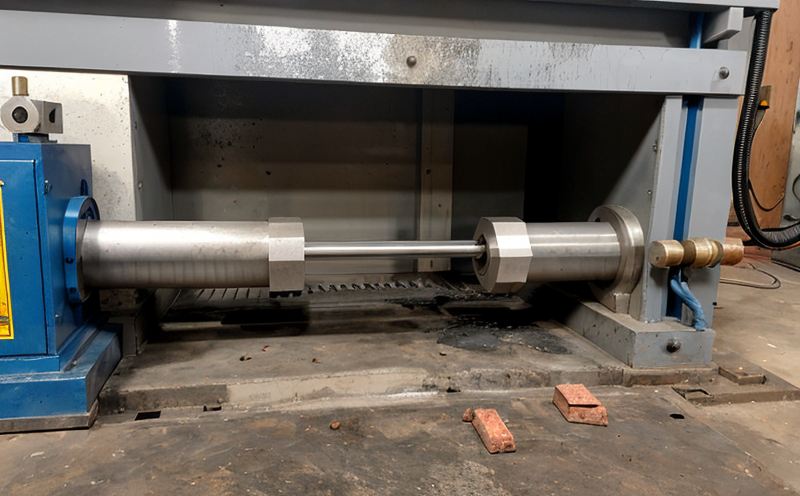ASTM D2240 Shore Hardness Testing
The ASTM D2240 standard specifies the methodology and apparatus used to measure the hardness of rubber materials using a Shore hardness tester. This test is essential in quality assurance processes for ensuring that rubber products meet the required specifications set by industry standards.
The Shore hardness test measures the indentation hardness of various material types, particularly elastomers like rubbers. The test involves applying a standard force to an indenter and measuring the deflection or depth of penetration into the sample. The resulting value is expressed as a Shore hardness number which indicates how resistant the material is to indentation.
The testing procedure outlined in ASTM D2240 provides detailed instructions on sample preparation, instrument calibration, and data interpretation. It emphasizes the importance of accurate sample preparation to ensure reliable test results. Samples must be conditioned properly to account for temperature, humidity, and other environmental factors that can affect hardness measurements.
Instrumentation used for this test includes Shore hardness testers which come in various types such as Durometer, Rebound or Superficial Hardness testers. Each type has its specific range of use depending on the expected results from the test. Understanding these differences helps laboratories select the appropriate equipment to meet their testing needs accurately.
Quality assurance is critical when performing ASTM D2240 hardness tests because even minor variations in sample preparation or instrument calibration can lead to erroneous readings. Therefore, it's essential to follow the prescribed procedures meticulously and use certified reference materials during calibration checks.
In addition to manual testing methods described by ASTM D2240, automated systems are also available which offer increased precision and repeatability over traditional hand-held devices. These automated systems can perform multiple tests simultaneously, reducing turnaround times significantly while maintaining high standards of accuracy.
- Proper sample preparation
- Careful instrument calibration
- Use of certified reference materials
- Adherence to prescribed procedures
- Consistent environmental conditions during testing
- Automated systems for increased precision and repeatability
- Multitesting capabilities reducing turnaround times
- Precision measurement ensuring reliable results
The importance of ASTM D2240 Shore hardness testing cannot be overstated. It serves as a critical tool in quality assurance processes, helping manufacturers ensure their rubber products meet the desired specifications and perform consistently across different environments.
Why It Matters
ASTM D2240 Shore Hardness Testing is vital for several reasons:
- Quality Control: Ensures that rubber products meet the required specifications set by industry standards.
- Consistency: Provides consistent results across different production batches and environments, which is crucial in maintaining product quality.
- Regulatory Compliance: Helps manufacturers comply with international regulations regarding material properties.
- R&D Support: Assists researchers in developing new rubber compounds by providing reliable data on hardness characteristics.
- Purchasing Decisions: Enables buyers to make informed decisions about the suitability of rubber products for their applications.
In summary, ASTM D2240 Shore Hardness Testing is a cornerstone of quality assurance in the manufacturing and research sectors. Its significance lies in its ability to provide reliable and accurate measurements that are essential for maintaining consistent product performance and meeting regulatory requirements.
Eurolab Advantages
At Eurolab, we pride ourselves on delivering high-quality testing services that meet the stringent standards set by ASTM D2240. Our advantages include:
- Expertise: Our team of experienced professionals ensures accurate and precise testing results.
- State-of-the-Art Equipment: We use cutting-edge instrumentation to perform Shore hardness tests, guaranteeing consistent accuracy.
- Comprehensive Reporting: Detailed reports are provided with each test result, offering insights into the material's properties.
- Consistency: Our processes maintain a high level of consistency across all tests performed, ensuring reliability.
- Regulatory Compliance: We ensure that our testing aligns with international standards and regulations.
- Prompt Turnaround Times: Quick reporting helps clients make timely decisions regarding their projects or products.
- Continuous Improvement: Regular training sessions for staff keep us updated on the latest advancements in testing techniques.
Our commitment to excellence and adherence to international standards makes Eurolab a trusted partner for all your ASTM D2240 Shore Hardness Testing needs.
Quality and Reliability Assurance
- Calibration: Regular calibration of instruments ensures accurate measurements.
- Reference Materials: Use of certified reference materials for calibration checks enhances reliability.
- Data Validation: Continuous validation of test data against known standards to ensure accuracy.
- Environmental Control: Maintaining consistent environmental conditions during testing ensures reliable results.
- Training: Regular training sessions for staff keep us updated on the latest advancements in testing techniques.
- Audit Compliance: Ensuring compliance with international standards and regulations through regular audits.
- Precision Measurement: Utilizing advanced technology to provide precise measurements ensuring reliable results.
At Eurolab, we prioritize quality and reliability in every aspect of our operations. Our commitment to these principles ensures that you receive accurate and consistent test results that can be trusted for decision-making purposes.





